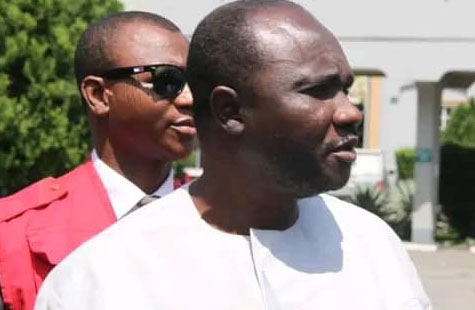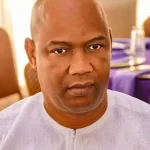...To get all news updates, Join our WhatsApp Group (Click Here)
Also Join our WhatsApp Channel (Click Here)
The Economic and Financial Crimes Commission, EFCC, on Wednesday, January 31, 2024, prayed Justice Daniel Osiagor of the Federal High Court sitting in Ikoyi, Lagos to issue a warrant of arrest to compel a former Executive Director on Projects, Niger Delta Development Commission, NDDC, Tuoyo Omatsuli to attend his trial over an alleged N3.6bn fraud.
Omatsuli , alongside Francis Momoh, Don Parker Properties Limited and Building Associates Limited, were initially standing trial on an alleged case of conspiracy and money laundering to the tune of N3,645,000,000 (Three Billion, Six Hundred and Forty-five Million Naira) before retired Justice Saliu Saidu of the Federal High Court, Ikoyi, Lagos.
One of the counts reads: “That you, Engr Tuoyo Omatsuli, Don Parker Properties Limited, Francis Momoh and Building Associates Limited, between August 2014 and September 2015 at Lagos, within the jurisdiction of this Honourable Court, conspired to disguise the illegal origin of N3,645,000,000 (Three Billion Six Hundred and Forty-Five Million Naira), being proceeds of unlawful activity to wit: corruption and gratification; and thereby committed an offence contrary to Section 18 of the Money Laundering Act 2011 as amended by Act No 1 of 2012 and punishable under Section 15 (3) of the same Act.”
Another count reads: “That you, Engr Tuoyo Omatsuli, between August 2014 and September 2015 at Lagos, within the jurisdiction of this Honourable Court, did procure Francis Momoh and Building Associates Limited to use the total sum of N3,645,000,000 (Three Billion Six Hundred and Forty-Five Million Naira) paid by Starline Consultancy Services into the Diamond Bank Plc Account No. 0023785116 operated by Building Associate Ltd, when you reasonably ought to have known that the said sum formed part of the proceeds of your unlawful activity to wit: Corruption and Gratification; and you thereby committed an offence contrary to Section 18 of the Money Laundering Act 2011 as amended by Act No 1 of 2012 and punishable under Section 15 (3) of the same Act.”
They pleaded not guilty to the charges preferred against them.
The EFCC, after calling 16 prosecution witnesses, subsequently closed its case against the defendants. However, rather than open their defence, the defendants filed a no-case submission, which was heard on October 12, 2020.
In his ruling on November 11, 2020, Justice Saidu had discharged the first defendant, Omatsuli, saying, “I have gone through the charge preferred against the defendants as well as the evidence of all the 16 prosecution witnesses and I found no reason for the first defendant to enter the defence.”
Consequently, the EFCC vowed to appeal the discharge of the former NDCC boss. On April 13, 2022, a three-man panel of the Court of Appeal, Lagos Division, upheld the appeal of the EFCC, and dismissed the ruling of the trial court.
The judgment delivered by Justice Festus Obande Ogbuinya held that the ruling of the lower court dated November 11, 2020 discharging the respondent, Omatsuli, of the money laundering charges “is hereby set aside and he shall enter into his defence accordingly on the same counts.”
The Appellate Court, however, discharged Omatsuli on counts 27, 28 and 29 of the charge. In the course of the trial, Justice Saidu retired and the matter was subsequently re-assigned to Justice Osiagor.
However, at the resumed sitting on Wednesday,counsel to the 2nd defendant, Norrison Quakers, SAN informed the court that Omatsuli was absent in court because he had an appeal pending before the Supreme Court. “The first defendant is on appeal at the Supreme Court. A no- case submission filed by the 1st defendant before the Federal High Court was upheld and EFCC appealed the decision. This decision was, however, reversed at the Appellate court and the no-case submission dismissed. The defendants were ordered to enter into their defence. Dissatisfied with the ruling of the Appeal Court, the 1st defendant appealed to the Supreme Court and the matter is yet to be determined”, he said.
He also told the court that the 1st defendant was not aware of Wednesday’s hearing because he was not represented by a counsel at the last proceedings.
Responding, prosecution counsel, Ekele Iheanacho, said: “At the previous sitting, sometime in November 2023, the matter came up for arraignment, and a counsel appeared on behalf of the 1st defendant. The court then asked us to choose a date for arraignment. On that basis, I didn’t ask for a bench warrant against the defendant.”
He further told the court that “There is no stay of proceedings in the law, according to the Administration of the Criminal Justice Act, ACJA. The pendency of the appeal does not prevent the proceedings at the Federal High Court from going on.” While making reference to S352 of the ACJA, Iheanacho, therefore, applied for a bench warrant against Omatsuli.
Justice Osiagor disagreed with Iheanacho that the 1st defendant was aware of today’s hearing and, therefore, ordered that he be put on notice.
The case was adjourned to March 22, 2024 for re-arraignment and trial.
You can get every of our news as soon as they drop on WhatsApp ...To get all news updates, Join our WhatsApp Group (Click Here)
Also Join our WhatsApp Channel (Click Here)

















